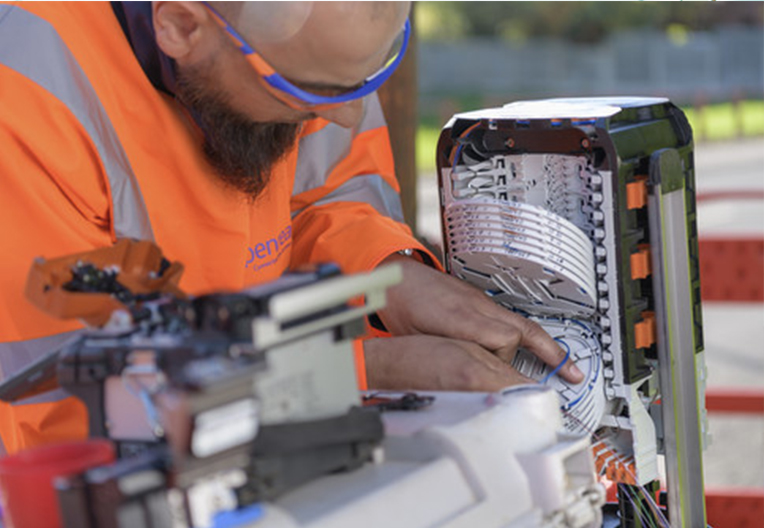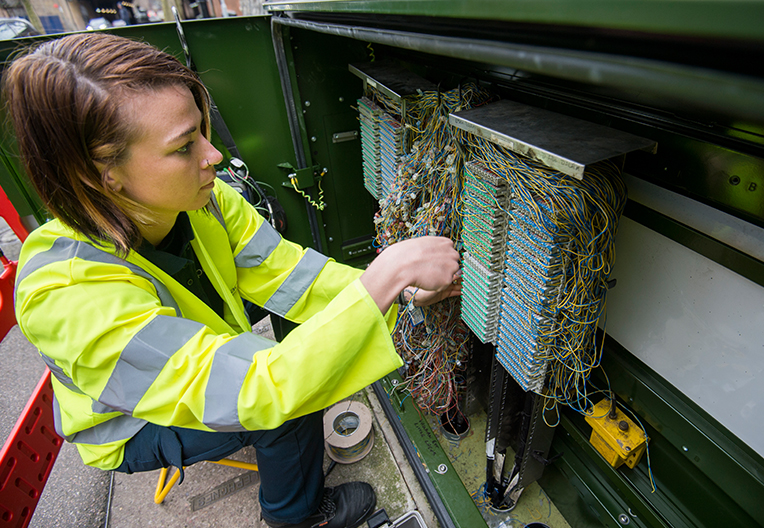- News
- |
- Fibre
- Fibre first
- Broadband
Full Fibre Broadband is going to turbocharge the economy - here's how | Openreach
By fibre'ing up the country, we believe we’re going to transform the way people live and work. But where’s the evidence?
"We’re convinced that Full Fibre technology will be a platform for growth, and now we can show how"
What the experts had to say…
1. Nationwide rollout of Full Fibre could provide a £59bn boost to UK productivity by 2025
For businesses, Full Fibre connectivity can provide a wealth of efficiency improvements and cost savings through improved online sales and marketing, improved online ordering and invoicing, cheaper broadband powered phone services, and better access to cloud-based computing services. For example, Full Fibre connectivity combined with cloud computing means businesses can upload, store, access and download vast amounts of data in minutes instead of hours. Data is backed up and securely archived off-site so not relying on costly, ageing servers taking up expensive office space.
2. Full Fibre could enable 400,000 more people to work from home, helping them avoid the commute and travel-related stress, and have greater choice about where they live
A faster and more reliable Full Fibre connection can give people the same levels of access to everything they can do online in an office, remotely from home. For example, Full Fibre allows for seamless high definition video conferencing, reducing time-consuming and expensive face-to-face meetings and helping to make remote and flexible working become the norm.
3. Full Fibre can help save 300 million commuting trips each year
Greenhouse gas emissions will be cut to almost zero by 2050 under government plans to tackle climate change. By enabling more people to work from home, a Full Fibre nation could save 300m commuting trips each year – with three billion fewer kilometres travelled by car. That’s a saving of more than 360,000 tonnes of carbon dioxide emissions per year.

4. Around 270,000 people could be free to move to rural areas
Many rural areas are struggling to keep their communities alive as younger people move away to more urban areas in search of more job opportunities. Full Fibre connectivity makes rural areas more attractive for businesses to move to and invest in which, in turn, helps to create more local jobs. A recent study by the Confederation of British Industry (CBI) found that 82 per cent of firms said the quality and reliability of the digital infrastructure were significant factors when they were deciding where to invest.
Full Fibre can make essential services more accessible in rural locations by bringing them online including e-health, e-education and e-government services. Use of the internet now touches every part of the curriculum, with pupils using it every day for everything from interactive exercises to doing online research for school projects and homework. Full Fibre availability reduces the risk that children will miss out on what is now an essential learning tool.
5. Over 125,000 parents with dependent children could be supported to re-enter the workforce
The greater freedom to work from home that Full Fibre brings means people like working parents could flex their working hours, with less time taken up for a commute. They could find time to work around looking after young children in the home or at school.
The evidence from the report is clear, Full Fibre broadband will turbocharge UK productivity, competitiveness and prosperity for decades to come. It will transform lives, improve public services and future-proof the UK economy.
Michael Salter-Church
Director, External Affairs & Policy
Related Articles
-
36 new locations will benefit from our future-proof broadband over the next 12 months
31 Jul 2019 We’re building at a massive scale. Every 30 seconds we pass a home or business with our new future-proofed full fibre network.
We’re building at a massive scale. Every 30 seconds we pass a home or business with our new future-proofed full fibre network. -
Goodbye old telephone network, hello new opportunities
27 Jun 2019 We’re modernising the way we deliver phone and broadband services across the UK - moving from existing analogue and copper technologies to faster, more reliable, fibre broadband.
We’re modernising the way we deliver phone and broadband services across the UK - moving from existing analogue and copper technologies to faster, more reliable, fibre broadband.



















